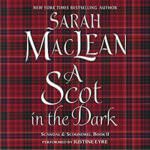 Narrated by Alison Larkin
Narrated by Alison Larkin
The Autumn Bride had some rocky moments for me, both in terms of plot and narration, but overall, I count it a win.
Abigail Chantry is a governess in London. Her not-quite-18-year-old sister, Jane (supposed to be on her way to take up a position as a companion to an older lady) is abducted and drugged and taken instead to a brothel. There is to be an auction as she is a virgin. Fellow abductee Damaris conspires to help Jane and brothel maid Daisy and assists both girls to escape to Abigail. As a result, Abby loses her position and the evil brothel owner is angry his property escaped. Now on the run and penniless, they form a plan to travel to Bath and find work and a less sticklerish society but need money to do so. When Jane falls ill, Abby is desperate and decides to try her hand at burglary so Jane can see a doctor. Instead of a silver salver, she finds Lady Beatrice Davenham, an old lady who is being sorely mistreated (and starved) by her servants. Through a serendipitous series of events, the girls move in with Lady Bea and rename themselves the Chance sisters.
Lord Max Davenham was 18 when he ascended the title, only to find there was no money and all the property needed to be sold. Rather than turn his beloved aunt out of her house, he devised a plan where he borrowed money and made certain promises. He had ten years to go trading, pay off the loan, and make more cash for himself before fulfilling the remaining promises. After receiving a worrying letter, which indicates his Aunt is being taken advantage of, he returns to London a year early. He’s super rich now anyway and he’s paid off the loan so there’s nothing holding him back.
The setup takes a long time. It is quite well into the book before Abby and Max even meet. This is not one of my favorite scenarios – I prefer romances where the main characters spend a lot of time together. I also felt that the trauma Jane and Damaris had suffered, was treated rather glibly. It’s a combination of both the text and the delivery in narration. What happened to those girls was horrendous and I felt uncomfortable that it wasn’t taken more seriously.
I also don’t usually care for big misunderstanding plots. When Max first meets Abby, he believes she and her sisters are the ones referred to (as taking advantage of his aunt) in the letter that called him home. Aunt Bea does little to help here. Fortunately, that misunderstanding is quickly cleared up. And, there is a good reason why Abby is not forthcoming about what really happened – after all, she committed a crime (burglary) and her sisters were found in a brothel. She doesn’t know Max and cannot know that he can be trusted with such information. That being the case, I was able to put aside (mostly) my dislike for the trope. However, by the end of the book, I felt Abby’s actions in not trusting Max, after she had just reflected that she ought to have trusted him with the truth earlier, were more in service of the plot than anything else.
Lady Bea was huge fun; lively and acerbic, devoted to Max and very quickly, to the girls as well. I enjoyed the interplay between the girls and Featherby and William (servants Abby hired). The romance between Abby and Max was fairly subtle and those looking for a steamy listen will be disappointed. While the bedroom door is open, it isn’t visited often.
I had mixed feelings about the narration. I’ve not listened to Alison Larkin before and, in the end, I would say that I enjoyed it but there were two things which made it a struggle for me at times. First, Ms. Larkin played fast and loose with full stops. There were times when the full stop appeared before the sentence ended. There were far more times when the sentences just ran together because the full stops were omitted completely making it difficult for me to understand. It was annoying. Used sparingly, running sentences together can be very effective – Lady Beddington’s character actually spoke this way and it was perfect for her. But there was too much of it in the general narrative for my liking.
She also mispronounced “Bea” the entire book. It is pronounced “Bee”. It is NOT pronounced “Bee-ah”. As Lady Bea is a major character, I was forced to listen to her name being mangled with all the joy of fingernails down a blackboard over and over and over again.
However, Ms. Larkin’s accents are wonderful – she delivered upper crust, Northern England and cockney, as well as an Irish accent too. Her male voices are very good as well. I particularly enjoyed Lord Freddie Hyphen Hyphen (both in actuality and when he was described). The age of the characters was also clear to my ear and the humor was (for the most part, see my comment regarding Jane and the brothel) appropriately delivered and charming.
Ms. Larkin’s voice was pleasant to listen to – if only she’d slow down a little and give a greater pause between sentences (and pronounce the names correctly), I could see her becoming a favored historical romance narrator.
Kaetrin
Narration: B-
Book Content: B-
Steam Factor: At the extreme, tame edge of I’m Glad I Had My Earbuds in
Violence: Minimal
Genre: Historical
Publisher: Tantor
Autumn’s Bride was provided by Tantor Audio to Audiogals for a review.




1 thought on “The Autumn Bride by Anne Gracie”
Comments are closed.